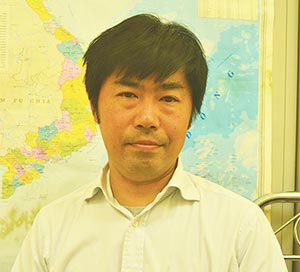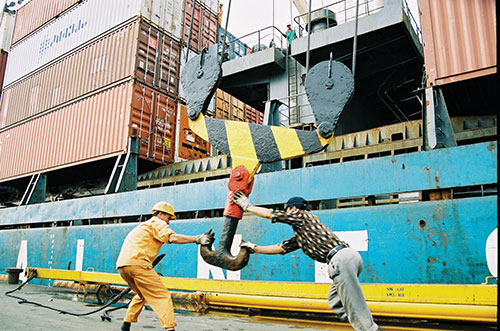Scrap imports need stricter regulation
 Should Vietnam ban or not ban the import of scrap metal?
Should Vietnam ban or not ban the import of scrap metal?
Vietnam should follow the world’s regulations on scrap imports and the new Law on Environmental Protection (LEP) should cover an article on this. I think that while Vietnam is trying to develop into an industrialised nation, it will have big demand for materials and scrap for local manufacturing. Obviously local sources of materials and scrap are insufficient, and therefore the country has to import more.
However, Vietnam currently lacks specific feasible regulations and mechanisms in distinguishing material from scrap and waste. That’s why many enterprises have used this loophole to import hazardous waste into the country.
Under the Basel Convention on the Control of Trans-boundary Movements of Hazardous Waste and Their Disposal, all developed and developing countries have to obey strict regulations on the disposal of hazardous waste. However, normally developing countries aren’t so strict on obeying this convention as developed countries. I think developing nations like Vietnam should consider a few solutions.
The first solution is that Vietnam should continue banning the import of scrap whether hazardous or not. However, it is very important that the definition of scrap and waste must be quite clear. We have to distinguish material from scrap and waste which are quite different from one another. Another question is who will examine the quality of such imports and where would they be stored? If this is resolved, then Vietnam should import scrap.
The second solution is that Vietnam should make new regulations to strictly control scrap imports, because the existing regulations seem too weak for the government to manage hazardous waste, while the country’s environment has been increasingly polluted to some extent by scrap imports. Many nations have also applied this solution.
However I think in the short term, Vietnam should continue a ban on scrap imports.

The Japanese experience offers a possible framework for Vietnam
to resolve the problems posed by imported scrap
Can you provide any international experience in controlling import of scrap?
In order to become an industrial nation, Japan used to import and export scrap decades ago. However, the Japanese government applied many solutions to curb pollution in developing countries caused by exported scrap including hazardous material. For example, Japan has specific regulations on classifying materials, waste, and hazardous waste. At present, Japan have classified and listed more than 400 types of materials.
Additionally, Japan also has strict regulations on scrap imports. When an enterprise wants to import or export scrap it needs permission. After the proposal gets the agreement from an agency, the enterprise must submit an inspection result report on scrap. Only after such an examination is the import allowed. In cases of scrap exports, the firm would need evidence of permission from the country the scrap is being exported to. Customs are responsible for inspecting the scrap
This system has quickly boosted decision-making processes related to the trade of scrap.
Do you mean Vietnam should learn from this experience?
Yes! Some Japanese enterprises currently want to implement recycling projects in Vietnam. They will import scrap from Japan or other nations for processing in Vietnam, and products will be exported. However, the Vietnamese government eight years ago banned importing scrap from Japan. Moreover, Vietnam currently lacks a specific feasible mechanism on classifying materials, scrap, waste and hazardous waste. So currently these projects can’t be implemented in Vietnam. I also think this mechanism should be included in the new LEP in order to facilitate investors.
Under its WTO commitments, Vietnam will have to continue allowing the import of scrap. So what does Vietnam need to do to protect the environment?
Many nations also have to follow WTO commitments on scrap imports. However, one of the best solutions that they have used is to build technical barriers. I think this is a good example for Vietnam to follow.
You have just mentioned the Basel Convention. Despite joining the convention in March 1995, Vietnam still cannot strictly manage scrap imports. What strict regulations should the new LEP stipulate in order to closely control scrap imports?
Following the accession to the convention, Vietnam has devised some regulations on waste management to protect human health and the environment. The regulations also include the LEP (2005) which included a chapter on waste management.
However, due to many reasons, Vietnam’s waste management has limitations.
For example, the control of scrap imports remains relatively lax. Article 43 of the 2005 LEP and the Ministry of Natural Resources and Environment’s Decision 03/2004/QD-BTNMT on environmental protection in relation to imported scrap used as materials for production have effectively failed to control scrap imports.
Specifically, under these regulations, organisations, enterprises and individuals wanting to import scrap must notify the local departments of natural resources and environment of their scrap imports five days before they transport and unload scrap at their premises. So all audits of the quality of the scrap, which is waste by nature, are being conducted after the scrap has already been imported into Vietnam.
The regulations also stipulate that in cases where scrap fails to meet requirements, they must be re-exported or destroyed. However, reality shows that it has been very difficult to re-export or destroy the waste.
Japan also follows the convention’s strict regulations through many laws and regulations. For instance, we have a law on importing and exporting hazardous waste since 1994 and the law remains unchanged until now. Every year Japan exports about 326,000 tonnes of hazardous waste and imports about 101,000 tonnes of such waste. However, with this law, the imported hazardous waste doesn’t constitute a headache for authorities, because those enterprises want to export or import these wastes must make detailed reports.
I think the new LEP may mark a bigger advance in managing waste and hazardous waste if strict regulations are prescribed. If so, Vietnam would not need a law on importing and exporting hazardous waste like Japan. However, Vietnam needs to issue a decree on managing hazardous waste. At present, Vietnam only has a decree released in 2011 on solid waste management.
In order to effectively comply with the Basel Convention and protect the environment, Vietnam should revise all existing regulations on waste management, and exactly stipulate the definitions of scrap, by-scrap and waste in order to have proper management policies. All activities to control the import of scrap and by-scrap must be performed before the scrap and by-scrap are imported into Vietnam. Also, the functions of agencies in charge of examining and controlling the import of scrap also need to be made clear.
What the stars mean:
★ Poor ★ ★ Promising ★★★ Good ★★★★ Very good ★★★★★ Exceptional
Latest News
More News
- Going green to save a bundle (June 08, 2015 | 10:00)
- Green buildings: the rising trend (June 02, 2015 | 09:41)
- Green buildings – key to sustainable urban development in Vietnam (May 18, 2015 | 17:00)
- Feed-in tariffs continue to haunt green energy prospects (December 15, 2014 | 10:47)
- Building material types intrinsic to green ratings (December 09, 2014 | 11:56)
- Turning an eco- smart dream into reality (December 09, 2014 | 11:55)
- Green products enjoy a growing presence at Vietbuild Hanoi 2014 (December 01, 2014 | 10:06)
- Country profits from green building (November 24, 2014 | 11:02)
- Firms flout enviroment laws (November 17, 2014 | 10:48)
- Energy efficient sticks and carrots (November 10, 2014 | 15:30)
















 Mobile Version
Mobile Version